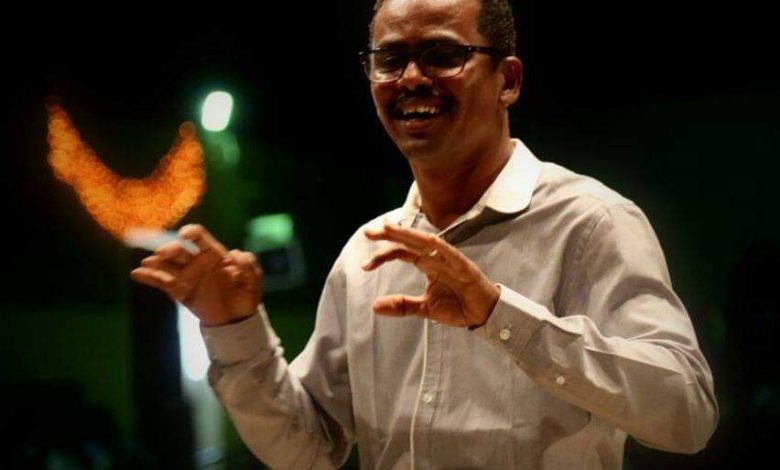Musician Safi Mahdi in a talk on art and war: The solution is in art

* Culture and arts are the way out of this crisis
* Art combines without regionalism or region
Interview:Magda Hassan
The musician and composer Al-Safi Mahdi, Professor of Music Composition at the College of Music and Drama (Maestro) in the College Choir, continues to describe his approach that can make culture and arts a way out of the current political crisis that has led to war, represented by managing cultural and ethnic diversity and managing a dialogue that removes fears. Al-Safi was in the part The first of the interview talked about establishing a new singing choir in the city of Port Sudan as his first post-war project since his departure from Khartoum. Al-Safi Mahdi is active during this period in many of the artistic works that he has completed and which are being prepared
He continues to talk about marriage by resorting to members of the College of Music and Drama
The choir is dispersed among the vast Sudanese cities, and this is not new. What is happening in Khartoum was happening in Darfur, South Kordofan, and the Blue Nile during the period of the 1990s and 2000s. This led to a large exodus from the South and Darfur, including Khartoum at that time.
Unfortunately, neither the government at that time nor civil society provided assistance to the displaced. Where they lived around Khartoum and what was later known as the poverty belts around Khartoum, aid did not reach them as it should. Now the world has dealt us the same standard, but seeking refuge outside the country has conditions and procedures
*Do we expect new arts to emerge after the war?
Perhaps, war is bad because it ends all forms of life, including arts, culture, and thought. War means death, man and all aspects of life, but what is certain is that after the darkness subsides and peace prevails, there will be new life and new arts, heralding our acceptance of each other and our lack of fear of our diversity, so that art works to accept us. For the end
*Should I mention cultural diversity, has it become more of a tone than a blessing?
Cultural diversity and pluralism are a blessing. The tone is at the level of ethnic pluralism because the field of arts, even at the level of folk art, the dancers of traditional folk art, are very peaceful.
Cultural pluralism comes from ethnic pluralism. At the ethnic level, it is used, directed, and benefited from to achieve political gains or to settle scores, as we saw in Most of the wars that broke out in Sudan, especially during the rule of the Muslim Brotherhood during the past thirty years, occurred in Darfur, South Kordofan, Blue Nile, and eastern Sudan. Before that, there was only the war in the south and the armed movements, and these were the seeds of division that the British had previously planted by implementing the policy of closed areas.
*But it is clear that most of the problems are multiple?
Most of the problems were due to lack of understanding of ethnic diversity. All the problems were solved by the openness of these societies to each other to remove fear. The Hausa opened up to the Jaalites, the Shaikia to the Borno, the Beja opened up to the Danglas and the Halfawi immediately, and the Masalit to the Qumuz. In the end, we will find ourselves all one, and the reason for ignorance is what produced the image about us. According to the Levant and the Egyptians, we are cannibals and the reason for this is ignorance of the other
* Can culture and arts be a way out of this crisis?
Yes, the way out of this crisis is culture, and the arts play a major role in it. We tried military politicians, they displaced us and brought us disasters, and the solution that we did not pay attention to is to manage diversity and pluralism. The youth of Port Sudan have a saying (the solution is in art). The arts have a role. For example, a number of dramatic musicians go to shelters to entertain them and reduce the effects of trauma, particularly since the loss varies. There are those who lost a loved one, and there are those who lost what they possess.
They provide messages, the first aspect of which is recreational and entertaining, but they are messages to hold on and not lose hope and condemn war for that solution in art
*Are there any technical initiatives to contribute to this solution?
There is an initiative in the coming period, the details of which I will not reveal now, but it is being carried out by fellow artists in Port Sudan, which includes the largest number of artists in the various fields of arts, dramatists, musicians, cinematographers, writers, poets, all of whom will launch a partnership initiative with the community in the Red Sea State and the large clubs and institutions.
It is an artists’ initiative that contributes to the unity of the social fabric
The call to arming on tribal grounds leads the temple to initiate a blocking of the roads in the face of such claims (the flinch made them ring the stops). We will now resort to the voice of reason and reject regionalism and regionalism.
What radiance did you see during the war?
There are many activities in the states. There is a Shorouk Forum in Gedaref, a drama activity in Madani. We saw work by Professor Al-Fateh Hussein. There are many experiences, and these are for example.



